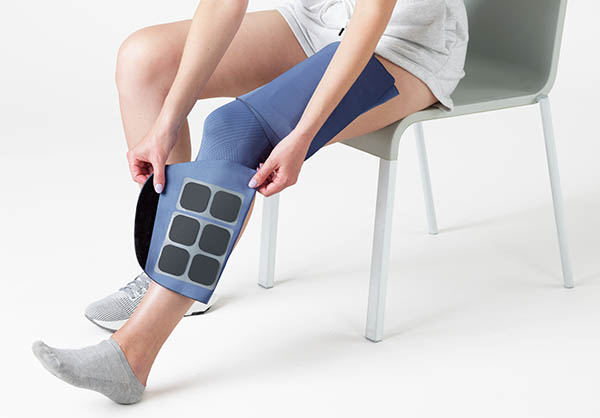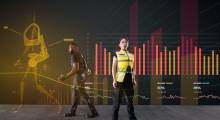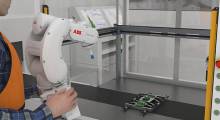Designing wearable technologies for worker augmentation or therapeutic use is as much an art as it is a science. Cionic Inc. today announced that it is collaborating with Yves Behar's multidisciplinary design firm fueseproject. The partners will work to refine the Cionic Neural Sleeve, a device that uses artificial intelligence to understand and influence human mobility in real time. It is designed to enable greater access and independence for people with impairments from conditions such as multiple sclerosis, stroke, cerebral palsy, and more.
“Building bionic clothing that can augment human movement takes a thoughtful and holistic approach,” said Jeremiah Robison, founder and CEO of Cionic. “It starts with advanced technology capable of adapting to each user's mobility needs to deliver meaningful outcomes.”
“Then we designed it to be comfortable to wear and effortless to use,” he added. “From software to soft goods, our team of experts have pushed the boundaries of human-machine interface to deliver the future of assistive technology.”
Motivated by his daughter's journey with cerebral palsy, Robison founded Cionic in 2018. More than 35 million Americans and 200 million people worldwide live with mobility impairment, noted the San Francisco-based company.
Cionic builds wearable technology to enable people to move with more freedom and control than with crutches, walkers, or wheelchairs. It said its Neural Sleeve combines the diagnostic power of a gait lab with the therapeutic power of functional electrical stimulation (FES) in a lightweight, durable garment.
fuseproject designs sleeve to change lives
fuseproject worked with Cionic to deliver a design that prioritizes user experience, building more than 50 prototypes for testing. The Cionic Neural Sleeve is designed for everyday wear and to be easy to put on and take off, which is critical for those with inhibited mobility, said the partners.
The lightweight, breathable fabric feels like an athletic legging and is available in multiple colors and sizes, said Cionic. Paired with an intuitive app, the sleeve enables users to be in control of their own mobility journeys, it claimed.
“It was imperative to us that the product not only has a significant improvement for users physically, but also to remove some of the emotional burdens that come with having a mobility difference,” said Behar, founder and CEO of fuseproject.
“This meant building a product in tandem with potential users so we understood their needs and could create the best possible solution,” he explained. “Good design serves to humanize technology and provide life-changing solutions.”
Swiss designer, entrepreneur, and educator Behar founded fuseproject in 1999. The design studio collaborates with partners globally to deliver products and experiences in technology, robotics, furniture, and consumer goods. fuseproject also offers design strategy, graphics and branding, product naming, user interface and experience (UI/UX), and experiential built spaces.
The company's partners include Herman Miller, Movado, Samsung, Puma, Issey Miyake, Prada, SodaStream, Nivea, The Ocean Cleanup, and Fabien Cousteau's Proteus Ocean Group (POG).
“Ultimately, we are creating not just a single solution, but a platform for bionic clothing that can analyze, predict, and augment human movement for all,” Robison said.
Cionic Neural Sleeve produces real-life results
Cionic reported that trial participants across multiple locations demonstrated strong improvement on the two key measures associated with foot drop: dorsiflexion at heel strike (94% of users) and ankle inversion during swing (88% of users). When combining the two measures, there was an average improvement of 9° for participants, with 5° considered clinically significant), noted the company.
Dr. Jacqueline Nicholas, system chief for neuroimmunology and multiple sclerosis (MS) at the OhioHealth MS Center, has been an advocate for the Neural Sleeve since seeing two of her MS patients walk better than they had in 10 years after programming the device to their needs.
“This is the first comprehensive system that addresses key muscle groups of the leg, which means it has the potential to improve mobility and function with continued use,” she said. “It’s unlike anything I’ve ever seen.”
Cionic has also been conducting home usability trials to understand the effect of its Neural Sleeve on mobility over time. Not only have many of these users reported mobility improvements, but the number of users experiencing moderate to severe pain was reduced by 60%. The number of users experiencing moderate to severe anxiety or depression was reduced by 75%, said the company.
Beverly Chaidez, who lives with MS and a participant in the home usability trials, described her experience with the Neural Sleeve: “When I started the home usability trial, I was only able to walk for about five to 10 minutes at a time, and I used a wheelchair for mobility outside of the home.”
“Today, I can walk for 40 to 50 minutes at a time, and I haven't used my wheelchair in over a month,” she said. “I feel hopeful and optimistic that I can regain a lot of things that I lost.”
The Cionic Neural Sleeve has received accelerated clearance from the U.S. Food and Drug Administration (FDA). The company is now accepting pre-orders at its website for early 2023 delivery.
Article topics
Email Sign Up
















